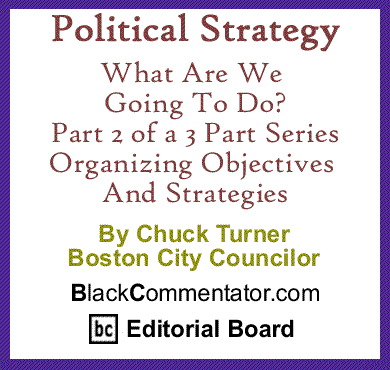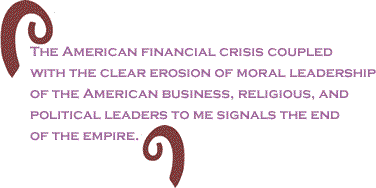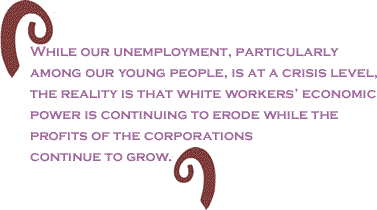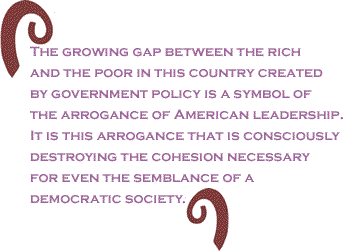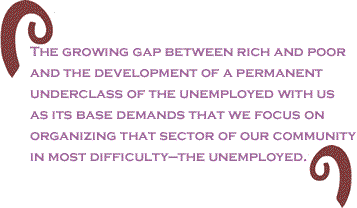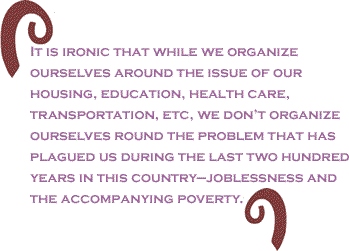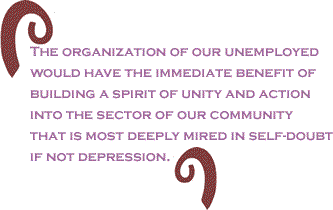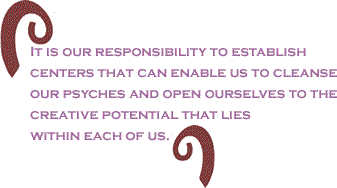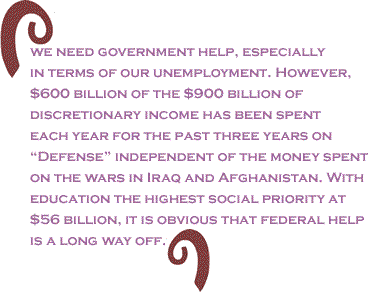
|
||||||||||||||||||||||
 |
||||||||||||||||||||||
 |
||||||||||||||||||||||
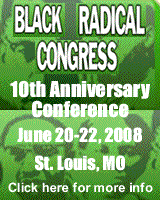 |
||||||||||||||||||||||
 |
||||||||||||||||||||||
 |
||||||||||||||||||||||
 |
||||||||||||||||||||||
 |
| The current issue is always free to everyone |
|
Chuck Turner is the guest Thursday, June 19th at 7PM ET
|
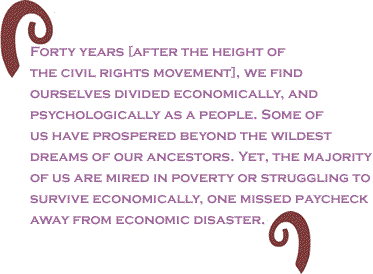 |
Note: This is the second of a three part series outlining a plan for the future - a political strategy for African Americans and Progressives to move forward in America. Organizing Objectives In Part 1 of this series, I argued the need for us to develop a process of awakening that enables us to move beyond the definition of inferiority imposed on us by others. Yet, this process of self-realization has to be blended into organizing strategies that enable us to unite our energies in pursuit of common objectives. Without such a blending, we will not be able to develop as a people the quality of life and appreciation of self and kind that move us away from the negative legacy of slavery and neo slavery. Effective organizing strategies flow from the development of clear goals. If you don’t know where you are going, it is clear that you will not be able to get there. In the sixties, the goal of the civil rights movement was full, fair participation for African-Americans in the American political, economic, and social system. “Freedom Now” was a call for the end of the oppression by the white society and inclusion of African-Americans as a group in American prosperity as we had been excluded as a group. Forty years later, we find ourselves divided economically, and psychologically as a people. Some of us have prospered beyond the wildest dreams of our ancestors. Yet, the majority of us are mired in poverty or struggling to survive economically, one missed paycheck away from economic disaster. In the fifties and sixties we had optimism about America’s economic future and the possibilities of our inclusion in it. Today the reality of this country’s downward spiral is becoming clear to all. The greed of America’s financial service industry with its foreclosure scams and financial manipulations is wreaking havoc not only on our own economy but that of the world. The American financial crisis coupled with the clear erosion of moral leadership of the American business, religious, and political leaders to me signals the end of the empire. While our unemployment, particularly among our young people, is at a crisis level, the reality is that white workers’ economic power is continuing to erode while the profits of the corporations continue to grow. The psychological power of the doctrine of White Male Supremacy coupled with America’s military and industrial power after World War II created an air of invincibility in the strength of the country even while struggling with the Communist “threat”. Yet a reading of history reveals that all empires eventually collapse as a result of their pursuit of self-development while ignoring the negative effect of their behavior on the world around them. Even the Roman empire, ruler at one point of the know world, collapsed from within due to the corruption at home and the expansion of military operations throughout the world that financially and morally destroyed Rome’s ability to exert the power and control that had enabled it to build an empire. The growing gap between the rich and the poor in this country created by government policy is a symbol of the arrogance of American leadership. It is this arrogance that is consciously destroying the cohesion necessary for even the semblance of a democratic society. From a Gnostic perspective, we are approaching the end of the “Aryan Age” where the human evolutionary objective was to build into the human consciousness the capacity to manipulate matter—to control the physical world. From this perspective, we are preparing to enter the “Age of New Galilee” where our evolutionary objective will be to develop a consciousness of the underlying unity of the human, animal, plant, mineral, and elemental forces on and within our planet as well as the unity within the solar system.
Given the fact that we appear to be witnessing as Elijah termed it, “The fall of America”, we need a focus that goes beyond the sixties’ goal of inclusion. Fifty years after the passage of legislation solidifying our legal participation in the American society, the economic opportunities for us seem more and more scarce as our unemployment rises and we see the cupboard is barer and barer not only for us but also for white workers while the rich including some people of color get richer and richer. The growing gap between rich and poor and the development of a permanent underclass of the unemployed with us as its base demands that we focus on organizing that sector of our community in most difficulty—the unemployed. Organizing Strategies A) Organizing Our Unemployed: As the American economy declines in strength and as American corporations place their manufacturing operations in other parts of the world and ship white and blue collar jobs overseas, what are we going to do to avoid going down with this sinking economic ship. I would suggest that our first step should be to organize our unemployed. It is ironic that while we organize ourselves around the issue of our housing, education, health care, transportation, etc, we don’t organize ourselves round the problem that has plagued us during the last two hundred years in this country—joblessness and the accompanying poverty.
Organizing our unemployed also enables us to reach our to our youth who are the most demoralized and at risk of all our unemployed, I believe. Given reports that over fifty per cent of Black and Latino youth in urban areas across the country are unemployed, the opportunities for organizing are endless. I would also suggest that this organizing focus gives us an opportunity to reach out to those gang members who are beginning to realize that gangsterism is a cleverly designed trap that the system uses to put our youth who are most frustrated under their lock and key.
However, the focus of this organizing has to have goals beyond obtaining a job. Focusing on getting jobs in a declining system is a not a sustainable development strategy. The outreach initiative in Boston that led to the development of an organization of the unemployed workers in 2005 was called More Than A Paycheck. This name was chosen to call attention to the fact that a commitment to self-development and group empowerment had to undergird any workers movement if it was to generate true success. In order to put their self help approach into action, the Boston Workers Alliance, an organization of unemployed workers in a predominantly Black and Latin section of Boston, hired the Industrial Cooperative Association to develop a feasibility study on the development of a staffing agency that could focus on placement of its unemployed members in temporary jobs as the start of a career development process. At the same time that one group of Alliance members are working on the development of the temp agency, another group is working on the development of a cooperatively owned company that converts grease that it collects from local restaurants into gasoline that is sold to stations providing fuel for hybrid vehicles. There is also exploration of a plan to develop a cooperatively owned company that would provide insulation as part of the growing weatherization aspect of the Green Economy. In other words, these workers have the same perspective as the Knights of Labor of the 1870s who not only organized workers who worked for others but also helped their members develop companies which they owned cooperatively to expand the range of job opportunities. After 400 years of economic oppression, are we to rely on the good will of the corporations not only for our survival but also for our development. B) Organizing Reeducation Centers: Our unemployed is the sector of our population most rooted in poverty and despair and therefore needs to be viewed as the target for organizing to become the base of a movement for change. However, the reality is that we all suffer from the psychological emasculation to some degree, I believe, described above. Therefore, our organizing strategy has to include a component that will enable us to cleanse ourselves from the effect of the brainwashing experience of being Black in America. Obviously, the educational system is not set up to enable us to free ourselves of the indoctrination designed to persuade us to accept the societal definition of Black/African-American inferiority. It is our responsibility to establish centers that can enable us to cleanse our psyches and open ourselves to the creative potential that lies within each of us.
To be more specific about how these centers might operate, let me share our attempt in Boston to develop a framework for building an initial prototype of such a center. A year ago, realizing that as an elected official running for election for a fifth two year term, I had to acknowledge that I saw government in the moment paralyzed in terms of its ability to respond in a positive creative way to the dilemmas my constituents face in Boston. Given this perspective, I developed what I called a Peace and Prosperity Pledge. This pledge has four components:
In addition to this pledge, we developed a 6 Point Plan for Economic Resurrection:
Once a month, we have a Peace and Prosperity meeting where we focus on education sessions to strengthen our ability to implement different elements in the Pledge. During the last four months we have focused on developing our ability to spring ourselves from the credit trap. These sessions ranged from presentations from a community banker and to a credit counselor to films on the predatory nature of the credit system, In Debt We Trust, a film by Danny Schechter and a segment of Zeitgeist focused on the problems associated with Central Banking. However, through out the four sessions we returned to the issue that our buying patterns are often driven by a need to compensate for our low self-esteem.
I view these meetings as a work in progress that evolves as the group members process our collective experiences and the thoughts that flow them. Some of us are discussing the possibility of establishing a Roxbury Institute of Space Exploration (RISE) through which we could help participants explore their inner space. As the participants strengthen their understanding of their inner space and how to make effective use of and strengthen these energies, a foundation would be laid for them to begin to understand that the outer space of nature is in fact a model of our inner space and vice versa. The driving force is the need to develop a system of self-exploration that can help the participants appreciate the fullness of the potential that lies within to enable one to obtain mastery. C) Organizing Freedom Villages: The devastation wreaked by Katrina on New Orleans was symbolic of a reality that confronts us in urban areas throughout the country—the fact that there are millions of our people in cities and towns across this country who are not prepared to cope with the problems of day to day living in urban areas, and certainly not prepared to handle disasters. While those with resources in New Orleans were able to escape to higher grounds, hundreds of thousands of others were trapped in the water by the forces of poverty, illness, and infirmity, as well as age. Levels of unemployment, rising cost of living, internalized oppression leading to violence inflicted on self and others are all part of the daily reality in our communities across this country creating a deadly trap waiting to be sprung. What’s to
be done? Obviously, we need government help, especially in
terms of our unemployment. However, $600 billion of
the $900 billion of discretionary income has been spent each
year for the past three At the state level throughout the country, there is a similar shrinking of resources, particularly in light of the decrease in tax revenue due to the recession sweeping over our economy. Given the fact that cities are at the bottom of the flow of tax dollars, cities in general have even less resources to attempt to resolve poverty and the growing economic stress that confronts our people as well as all the other races of this country. Given the above reality, I believe that it is essential that we build a network of Freedom Villages across every state in this country where there are a significant number of Black people. These villages, whose development will be driven by our social and economic dilemmas, could be crucial levers in moving us as a people beyond our internalized oppression while we develop an economic base to sustain our future. By creating an opportunity for demonstrating our creativity individually and collectively, these villages would enable us to redefine the reality of ourselves.
In addition, these villages can become key elements in America’s need to develop a network of regional economies that can sustain themselves as well as develop trading partnerships with other regions and countries. To develop such a network, we will need plans, resources, and people prepared for the rigors of being pioneers, The Reeducation Centers discussed above would be appropriate as training centers for the pioneers who will establish the new communities. At the same time these Centers will provide an opportunity for those who are less adventurous or more rooted to explore the reality of themselves and develop and use talents that they had not even dreamed of having before self exploration. Young people who make the transition from urban areas to Freedom Villages will be developing themselves as they build new realities and will be shaping themselves to come back into the cities and towns of America as leaders. They will come back prepared to lead those who want to move forward but are less advanced in terms of self-development. Castro, Che Guevara, and their compatriots left Havana for the hills of Cuba to launch in 1954 their drive to oust the Batista from power. Eight years later, they marched back into Havana when Batista’s troops refused to fight their own people. Mao and his compatriots acknowledged their defeat in the cities of China and withdrew to the countryside in order to regroup to challenge Chang Kai Chek and his nationalist forces. Twenty years later they defeated and drove from China the nationalist forces. Throughout
history including America’s, people have left developed areas
for the countryside or new lands when economic, political,
or social factors led to conflicts that seemed irresolvable
within the Obviously, there are a myriad of questions that need to be answered regarding the development of such Villages. These questions range from the ideal size of such villages to questions regarding establishment of educational systems, agricultural methods, economic strategies, etc. However, the purpose of this paper is to raise a framework for thinking about our future rather than laying out a detailed plan. Before moving on to discuss the politics of our situation, let me note that I believe that hemp could provide an economic jump start for the economy of this country in the 21st century that the peanut and Dr. George Washington Carver’s research on its properties provided for the DuPont family and the economy of this country in the 20th century. For those who are unaware, hemp is a plant that was outlawed through a political movement funded by Hurst and DuPont to stop Henry Ford from using hemp to build the body of his cars and serve as the key ingredient in the ethanol that originally powered his Model T Fords.
In addition, these Villages if well organized and focused on the unleashing of human energy and potential have the capability of developing a strong economic base. To the extent that they can develop a style and cost of living that is significantly below that in the nearby urban areas, they will be able to competitively price goods or services that are sold to those in the urban areas as well as nearby towns. D) Organizing Across Racial Lines: The color of our skin and our special status in this country has acted as a barrier to integration and organizing with those of other races even into the 21st century. However, the reality is that we are woven into the tapestry of America and have to have as part of our strategy an organizing perspective on alliances with those of other races. The present economic decline creates financial pressures that can increase the tension between groups as we see a need to compete for scarce resources. However, at the same time, these pressures create the opportunity for dialogue across the race, color, and cultural lines that focus on similarities of position and worldview. White workers have been very reluctant to ally with workers of color and many populist experiments designed to bring people of different races together ended in accusations of racism. However, the existence of a common system of oppression creates an opportunity to build enduring alliances across racial lines. Of particular importance is our need to develop alliances with other people of color, particularly Latinos and Cape Verdeans given the similarity of our economic situation, cultural heritage, and the fact that we often find ourselves living in either the same or neighboring communities. Despite the tensions over resources, we need to develop a framework of thought that emphasizes our common needs, history, and heritage. A key part of this organizing focus is to identify opportunities to create alliances that increase the strength of all the groups. In Boston, during the beginning of this century, the two black city councilors allied with a strong Puerto Rican candidate who was eventually elected as an at large Councilor and Boston first Latino Councilor. The three councilors of color then formed Team Unity as a symbol of their operational unity. In the next election, they joined ranks with a Korean candidate of similar progressive perspective and the Asian candidate was elected. Due to a number of unforeseen forces, the Latino candidate narrowly lost his position. However, his loss while demoralizing has inspired a surge in political activity in the community generating the expectation that there will be a progressive Latino elected to the Council in 2009. While political and economic organizing with Latinos, Asians, and Cape Verdeans is an important part of preparing for a new reality in this country, I believe that a key part of this aspect of our organizing strategies needs to focus on culture and the relationship between our various cultures. These organizations will bring young people of all races together to explore cultures and history as part of a process of acknowledging the oneness of humanity despite our differences. In the sixties, the existence of an organization in Boston named Puerto Afro, formed by a group of Black and Puerto Rican brothers, helped to create a sense of racial and cultural unity through their focus on the commonalities of our cultures. The reality is that there are more elements to unite us than divide us.
When focusing on cultural alliances, it is natural that we would reach out to groups of color, particularly the Latino culture given the reality of the blending of African cultural idioms into Latino culture and music. However, it is critically important that as African-Americans we realize that our culture is a blend of the all the cultures of the world just as our bloodline includes the blood of all racial groupings. The reality is that one-day African-Americans will be viewed as a new race that is the last race given that we carry within our bloodline the blood of all races. Given the political and economic turmoil of the moment it is difficult to acknowledge that reality but our inability to acknowledge the truth of the universalism of our bloodline makes it no less true.
Similarly, we need to recognize that while the bosses have historically pitted the white worker against the black worker, the reality is that white workers have been exploited also by the system of wage slavery. True, white workers, despite their oppressions, often view themselves as being owed all the entitlements that being white brings—including feeling superior to us. However, what is also becoming clear is that as the rich of this country move to increase their wealth the white middle class shrinks with more and more whites finding themselves in situations that create a feeling of economic oppression. This means that there is an opportunity for alliances with white workers that were never possible before. However, we cannot afford to sit back with the hope that they recognize the situation. In the 1970s, activists in Boston persuaded the Mayor to combine affirmative action policies for people of color and women with residency policies benefiting residents of all races on construction sites financed or aided by city authority and power. While legally challenged by the building trades unions and contractors, the constitutionality of the policy was affirmed by the Supreme Court in 1983 and the same year the Boston City Council instituted a policy requiring that a minimum of 50% of the hours worked in each trade on a project should be performed by Boston workers regardless of race, that 25% of the hours at a minimum should be provided by workers of color, and 10% should be provided by women. This policy has been helpful in minimizing the friction between white Boston construction workers and construction workers of color from Boston. However, the construction establishment has been able to avoid aggressive enforcement of the policy. This has led to Boston workers only getting an average of twenty percent of the hours trade by trade rather than fifty percent of the hours.
Given the growing unemployment in Boston, particularly among young people of all races, white Councilors are now beginning to be more vocal about the need to enforce this policy and are generating a level of heat that the councilors of color have not been able to generate on their own. There is even consideration being given to the development of a resolution calling on the construction contracts to voluntarily award twenty percent of the subcontracts to companies owned by Boston residents. Part 3 (Political/Electoral Organizing) of this 3 part series will appear next week (June 19, 2008). BlackCommentator.com Editorial Board member,Chuck Turner is a Boston City Council member and founder of the Fund the Dream campaign. He is the Chair of the Council’s Human Rights Committee, and Vice Chair of the Hunger and Homelessness Committee. Click here to contact Councilmember Turner.
|
Your comments are always welcome. e-Mail
re-print notice
If you send us an e-Mail message we may publish all or part of it, unless you tell us it is not for publication. You may also request that we withhold your name. Thank you very much for your readership. |
|
| June
12, 2008 Issue 281 |
|
| Executive Editor: Bill Fletcher, Jr. |
| Managing
Editor: |
| Publisher: Peter Gamble |
| Est. April 5, 2002 |
| Printer Friendly Version in resizeable plain text format or pdf format. |
 |
 |
 |
| |
| |





















